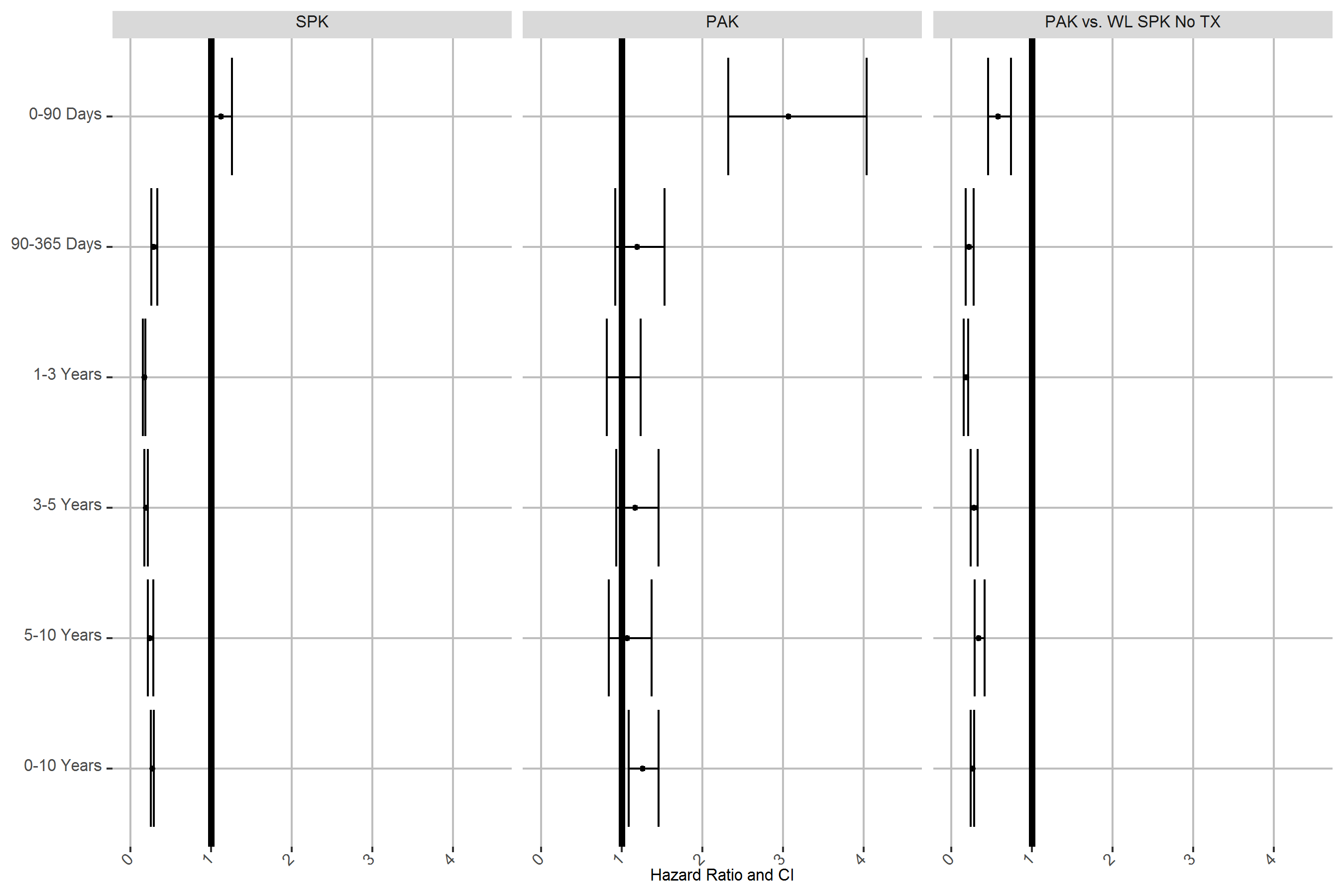2017 - IPITA
This page contains exclusive content for the member of the following sections: TTS, IPITA. Log in to view.
Pancreas Transplantation - Outcomes & Complications 1
5.8 - Revisiting Pancreas after Kidney (PAK) Transplantation
Presenter: Jonathan, Fridell, Indianapolis, United States
Authors: Jonathan A Fridell, Michael Curry, Jon Odorico
Revisiting Pancreas after Kidney (PAK) Transplantation
J. Fridell1, M. Curry2, J. Odorico3.
1Department of Surgery, Indiana University School of Medicine, Indianapolis, Indiana, USA, ; 2United Network For Organ Sharing (UNOS), Richmond, Virginia, USA, ; 3Department of Surgery, University of Wisconsin School of Medicine, Madison, Wisconsin, USA,
Background: PAK transplantation has historically been perceived to be inferior to Simultaneous Pancreas and Kidney (SPK) transplantation with respect patient and pancreas allograft survival. However, some single center studies show excellent outcomes of PAK recipients comparable to that of SPK recipients. The current analysis examines national level data to further explore PAK patient and graft survival.
Methods: Kaplan-Meier and Cox proportional Hazard models were used to analyze OPTN data from 1995-2010 to determine if receiving a transplant was more beneficial compared to staying on the waitlist. The analysis compared adult candidates and recipients for Pancreas Transplant Alone (PTA), PAK, and SPK procedures.
Results: Kaplan-Meier analysis among PAK recipients demonstrated that receiving a pancreas after kidney is associated with an increased kidney graft survival over 5 years compared to recipients who only received a kidney and no pancreas. This pattern was observed regardless of the type of kidney transplant received (i.e. living donor vs. deceased donor). Moreover, receiving a living donor kidney was associated with increased pancreas graft survival over 5 years compared to receiving a deceased donor kidney. With regard to mortality after transplant vs. remaining on the waiting list (WL),Figure 1 shows the hazard ratio (HR) of receiving a transplant compared to staying on the waitlist by procedure type, and receiving a sequential PAK transplant compared to a uremic patient on the SPK waiting list not receiving a transplant (4th panel). An HR < 1 indicates transplanted recipients have a survival advantage. When PAK transplants are compared to recipients who received a kidney transplant (2nd panel) it appears there is no survival advantage to getting the pancreas transplant. However, PAK transplant recipients who receive both organs have an increased survival advantage compared to uremic candidates who receive neither a pancreas nor a kidney (4th panel). Moreover, compared to uremic diabetic WL patients, SPK and PAK recipients showed similar overall patient survival benefits (compare panel #3 vs. #4).
Conclusion: A successful PAK transplant offers a survival advantage compared to those who receive neither a kidney nor a pancreas transplant, a comparison which has not previously been made which highlights similarities in patient survival outcomes to SPK recipients and the overall benefits of uremic diabetic patients receiving both a pancreas and kidney transplant either sequentially or simultaneously. Furthermore, these data corroborate prior data which suggests receiving a pancreas transplant may have a protective effect on the kidney graft.
Important Disclaimer
By viewing the material on this site you understand and accept that:
- The opinions and statements expressed on this site reflect the views of the author or authors and do not necessarily reflect those of The Transplantation Society and/or its Sections.
- The hosting of material on The Transplantation Society site does not signify endorsement of this material by The Transplantation Society and/or its Sections.
- The material is solely for educational purposes for qualified health care professionals.
- The Transplantation Society and/or its Sections are not liable for any decision made or action taken based on the information contained in the material on this site.
- The information cannot be used as a substitute for professional care.
- The information does not represent a standard of care.
- No physician-patient relationship is being established.
Contact
Address
The Transplantation Society
International Headquarters
740 Notre-Dame Ouest
Suite 1245
Montréal, QC, H3C 3X6
Canada
